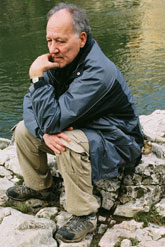Werner Herzog is a filmmaker of international fame, an artist, and a public intellectual. Since 1962, he has directed over fifty films on six continents, acted in a dozen films, directed more than twenty opera productions in eight countries, and published numerous books, screenplays, and articles.
Herzog’s significance as a filmmaker is beyond question; he is one of the leading figures in global cinema. Associated early on with the New German Cinema, Herzog has gone on to make scores of feature films and documentaries. He brings together a powerful artistic vision with a capacity for critical reflection. A Herzog film is often infused with his own reflections and philosophies, interesting character studies, and distinct landscapes. His is a singular vision that mixes documentary traditions with those of the avant-garde and fiction filmmaking.
Herzog made a series of narrative, documentary, and short films in the late 1960s, rising to fame with many of his productions, including Fata Morgana (1971), Aguirre, the Wrath of God (1972), and Stroszek (1977). He is probably best known and most critically acclaimed today for a remarkable series of feature-length documentaries, including Grizzly Man (2005), Encounters at the End of the World (2007), and Cave of Forgotten Dreams (2010). The films are physically beautiful, their austere and compelling locales shot with inventive uses of camera and sound that are guided by his strong authorial signature. His directorial vision is characterized by a profound curiosity about individuals or artifacts that exist in extreme or almost unreachable geographical sites. Herzog is known for his interrogations of the documentary form, as he questions its frequent association with discourses of sobriety and truth by inflecting it with his own imagination and surreal humor.
Werner Herzog’s passion for opera has been manifest in his films (most notably Fitzcarraldo 1982), and he has directed such notable conductors as Riccardo Muti and Lorin Maazel. He also recently participated in the Whitney Museum’s 2012 Biennial with an installation, “Hearsay of the Soul.” Herzog is the founder and director of the Rogue Film School.
Herzog’s accolades include the best director award for Fitzcarraldo at the 1982 Cannes Film Festival, the Alfred P. Sloan Feature Film Prize for Grizzly Man in 2005 at the Sundance Film Festival, and other awards from institutions such as the Berlin International Film Festival, César Awards, Directors Guild of America, and the Venice Film Festival.


